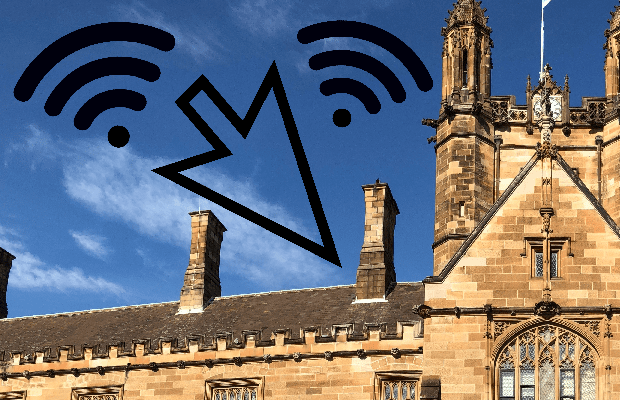A long day of classes draws to a close. I’m standing on a packed purple train carriage with two hours left of my commute. Scrolling through Facebook I catch up on what I missed back home. A wedding announcement, full time jobs — completely different but incredibly familiar lives. It’s comfortable. With the help of the network inside my phone I’m always connected to the comforts of home.
Uni is spoken about as a place where we face challenges, where the possibility of new experiences abound and where we make the friends of a lifetime. I first arrived at the University of Sydney (USyd) barely knowing anyone in Sydney, leaving the world of my high school and small town behind. Naturally I was eager to chat in the moments before class, but the harsh silence of the tutorial room was often far too intimidating. It was easier for everyone to sit quietly with Facebook in hand.
Social media has allowed us to remain firmly connected to what comforts us despite being immersed in confronting new situations.
Being a student from regional Australia, social media helped Molly become acquainted with her new environment. However, she found that social media limited more long-lasting, significant connections on campus. “I added a few people on Facebook and would talk with them about assessments, however that was the limit of the friendship,” she said.
Social media has changed how people interact on campus. Rob* is in his final year of a Bachelor of Arts and believes that “Social media connects students without the need for physical interaction,” he says, “people are becoming more lonely.”
For Rob, staying in touch with friends from home in Sydney’s south western suburbs came easier than making friends on campus. “People from your area have the same contextual upbringing as yourself. You both share the same social environment and it helps make connections to one another easier and more relatable.”
Research from the Programme for International Student Assessment (PISA) has found that Australian schools remain divided by socio-economic and geographic disparities. Metropolitan students from higher socioeconomic backgrounds outperformed regional students from lower socioeconomic backgrounds, according to their latest report. When students make it to university, this disparity becomes socially clear as students are naturally drawn to those capable of empathising with their previous experiences.
With social media allowing us to stay continually connected to people that share our upbringing and experiences, isolation dawns upon those who do not bring their home networks into university life.
For many students from regional areas or low socioeconomic backgrounds the already developed groups at university are intimidating and isolating. Most of Rob’s friends selected other universities, and without the familiarity of his home group, breaking into the already established circles at USyd was a challenge. “University life at USyd seems to be predominated cliques of people who know each other from high school, and it can be really difficult to break into these friendship circles.”
Rob sees that “people become more accustomed to their cliques of friends as they communicate over social media in closed groups, and people aren’t as keen to go out of their way to meet new people on campus.”
Molly knew that when she moved interstate for university, social media would help her connect to campus. However, she also saw social media as the buffer which kept students in their comfort zone. “If an awkward situation arises, our automatic response is to look down at our phone, scroll through social media, or even fake a phone call just to avoid a situation. It has come to a point where we find our comfort and validation in social media” she said.
After I moved to Sydney, campus life became more accessible. But I can still remember how lonely it was to be in a new place without anyone from home to start uni with. I remember how much I wanted to chat to the people sitting next me, or for the person sitting in front to just turn around and say hey. We all know the familiar dead silence that resides before a tutorial begins. Although it remains daunting to risk the first move and put our phone down, we may well discover that the person next to us is just as thankful someone broke the awkward silence as we are.





